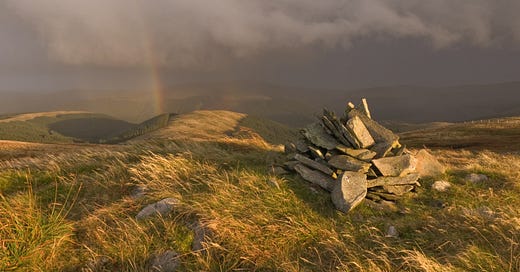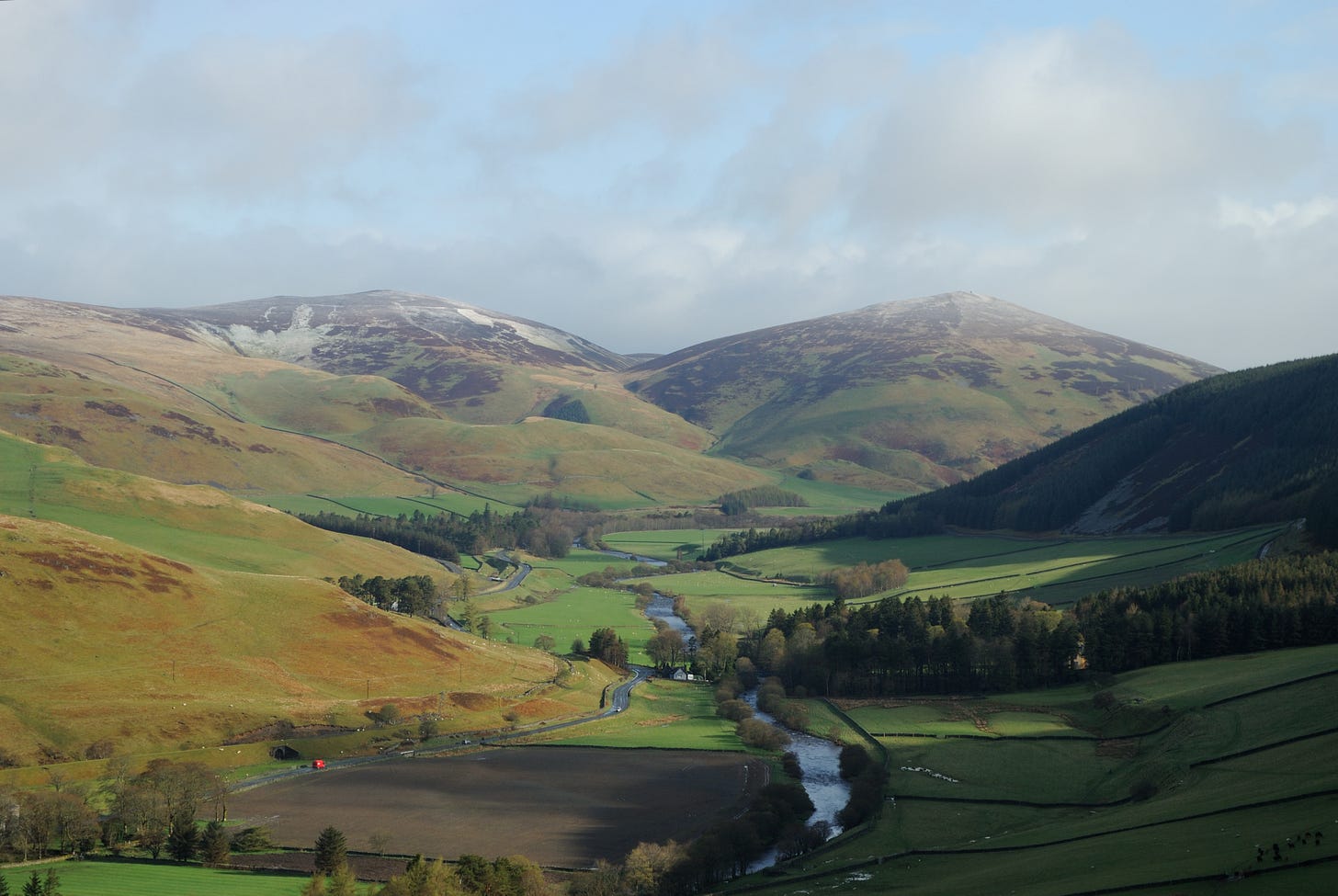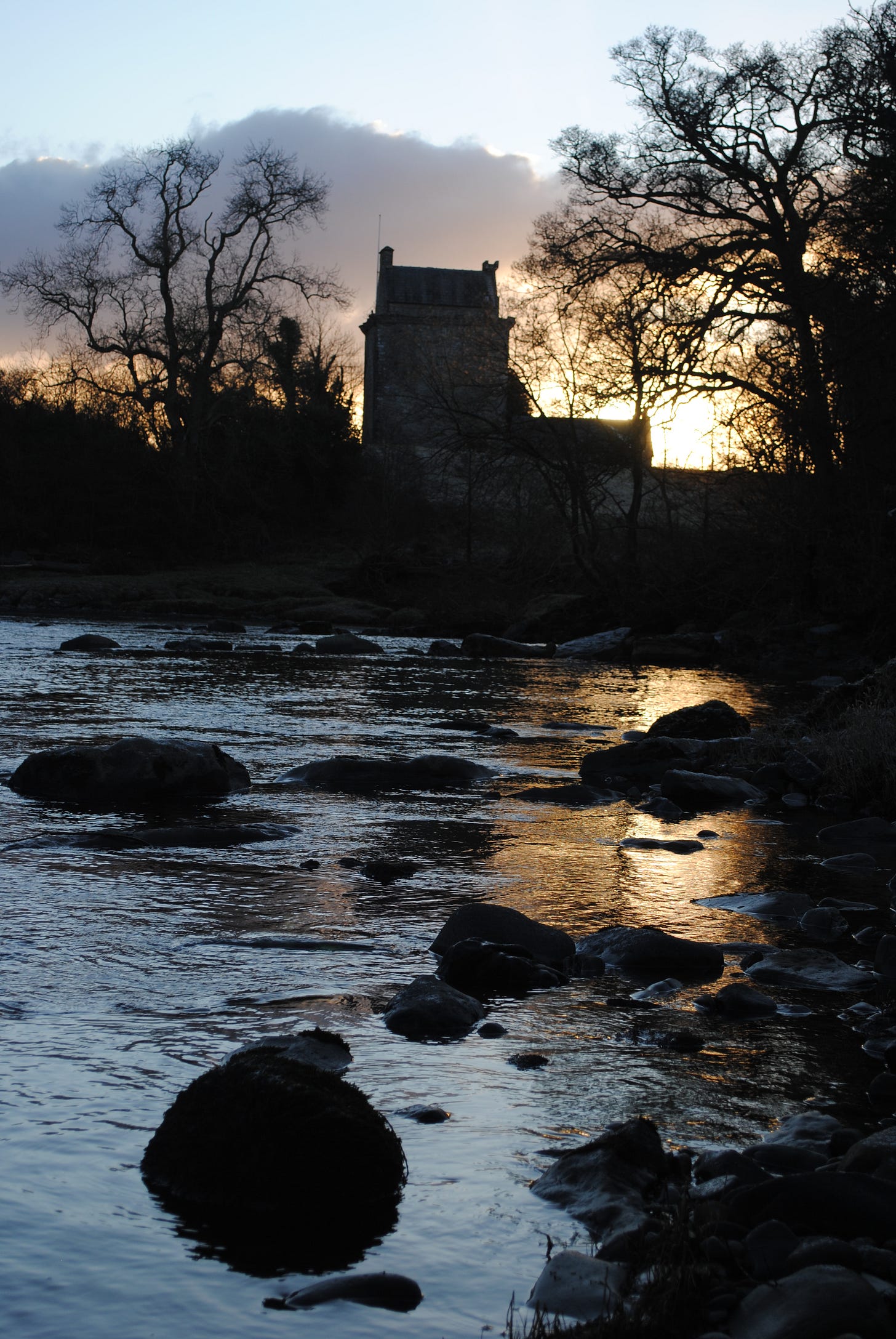At the top of the first steep slope, at the outer rampart of the old hillfort, Jamie Dodd stops to catch his breath. Once, people lived here in their small stone huts, were attacked here by their enemies and sometimes those enemies prevailed and the ones who lived here died along with their wives and their baby sons and daughters; those who died and those who killed them forgotten thousands and hundreds of years before any Dodds or Eliotts came into this country. And now Jamie looks down from the old fort, down on the glen that he will not be seeing again.
Down there, in the early morning shadows, the four walls of his house and a smudge of black that was the burned thatch. The wider black smudge that had been his barley, the weeds growing through it now. The broken down fences around what had once been his cow pasture.
The grassy hump with the two sycamore trees where his father and his grandfather lay buried, and the two fresh graves that were his wife Mary and his son, Wee Jock. And there, the rock above the river, where he left the two dead Eliotts for the ravens to peck out their eyes and tear the dead flesh off their bones.
For a long minute he looks down on the glen with its stone walls that his grandfather built, and the shining river; the glen where his whole life has passed. Then he turns his face to the high moors.
There’s only one place Jamie Dodd can go now.
He heads southeast up the long ridgeline, squinting into the spring sunlight. The rock-tor on the Harr stands against the sky, its shadow stretched across the yellow grasses. He leans against the warm rock, the granite rough on his back, closing his eyes against the sunlight. His shoulder, bound up in its blood with sphagnum moss, is just a dull ache now. Above, ahead of him across the moors, the cry of the curlews falls in bright curves across the sky.
He slows to a walk up the heather slope. Below him, the valleys on either side are filled with mist: white, gleaming in the sun, so that he travels through a world of skylark song abve the world. Ten hours later, the sun low in the west now; the hills blue, sharp shapes one behind the other against a sky the colour of a polished shield, his mind fuzzy with tiredness, the pain sharp now in his shoulder where the sword slashed through his leather jacket; Jamie Dodd looks down into a new valley.
Shining river, golden in the evening light. Stone walls, picked out in shadow. Cattle grouped on a green slope, the shouting of children drifting faint up the hillside. And the tower house, its stones glowing in the last sun. Branxhome Hall.
As he comes down the slope, the children see him; and fall silent. Eliott women and men stand back on either side as he walks up the ramp into the Eliott tower. Is that old Sir Hugh Eliott, standing with a rake in his hand, Sir Hugh whose son Geordie’s bones the crows are pecking, there on the rock above Jamie’s river? The Eliotts are expressing nothing in their faces.
Jamie is peat-stained to the waist, crumbs of peat dropping off him onto the scrubbed cobblestones. After the long journey his shoulder’s bleeding again now, he feels the blood sticky inside his cow-hide jacket.
Lord Duncan welcomes him at the inner door. “Jamie Dodd! A sensible fellow and a doughty fighter, where else should he come but here to Branxhome Tower?”
Lord Duncan’s beard is just flecked with grey: the rich woolens and silks he wears accentuate rather than conceal the broad shoulders and powerful limbs, the strength in his sword arm. Had he been there, on Jamie’s homestead, flinging the burning torch into Jamie’s thatch? Hard to say, in the darkness of that night; but the chieftain himself wouldn’t take part in what was, after all, a very minor bit of work.
“You must join us, Jamie Dodd, at my table. Take my bread, otherwise these men might think you come here with evil intent.”
The hall is high as well as wide, hung with tapestries on two sides, fireplaces – four of them – cunningly arranged so that almost no smoke drifts into the room itself, letting you see and admire the gilded decoration on the beams of the ceiling. The Eliotts take their seats around the table, curious, they can’t keep themselves from looking at Jamie where he sits beside their chieftain.
Lamb, stewed to tenderness with dried fruits. Stemmed glasses to drink out of, and the ale –dark, reddish-brown in the candlelight – not ale at all. Wine. After the first incautious draught, Jamie tastes it carefully, the sweetness of it, smooth on the lips but bitter at the back of the tongue. So that Jamie thinks of towns on the coast, ships bringing wine and metalwork and silks; towns with their little harbours, where men and women live by trading and tending the fields under the rule of their Queen and never watch the thatch of their houses burning in the evening air.
The wine is affecting him, making him reckless: as he turns to the Eliott: “Your cooks, they know their work. And the meat, so tender :raised on some gentle pasture, any man can tell. This would be one of my own lambs?”
He’s spoken louder than he meant, and a silence falls around the table. Hands with knives reaching towards the stewpot go suddenly still, shifting their grip.
Then Lord Duncan leans back in his high wooden chair and laughs aloud. “Jamie Dodd! You killed old Sir Hugh, I told him he was too old, should never have come on that riding. But young Dougie, his son, that was a surprise. I’ll have a word with Dougie’s father: our people were the raiders, there’s no complaint there. I’ll see you get no trouble from Dougie’s family.”
The heat from the candles, not to mention the four fires, has quite overcome the coldness of the stone walls behind their tapestries. Jamie is warm now, the sweat at the back of his neck and the stickiness of the blood drying at his shoulder. The wine is helping with the pain there.
The noise level in the hall is rising as the wine at the high table and the ale lower down does its work. The lord leans in confidentially. “I’m sorry about your wife and boy. Your Mary there, they’d not have touched her. No reason for her to start jabbing about with that spear, only one way that could end.
“But no worries, Jamie, we’ll soon have you fixed up. There’s old Sir Hugh’s Janet, she’s a fine young lass. There is the hare lip, of course, and some folk say she’s a bit touched in her wits. But no reason why she can’t bear you some fine sons.”
Jamie’s grandfather paid his rents to this man’s father; Jamie’s father, too, while he was alive. The two of them now, Jamie and Lord Duncan, go up the stone stairway to the roof of the tower, to look back over Jamie’s run.
Still a brown glow of sunset over the humped hills: but a three-quarter moon, half way up the sky above the thatched ridgeline. “Ten leagues, Jamie. I’m impressed. And I notice that wound in your shoulder, still troubling you.”
Below the tower, the river shines in the moonlight like a silver chain. The two men gaze up to where the hills rise in slow, gentle curves, grey-blue shapes fading to the night sky. “You came by the old road, the wee hollow above the waterfalls?”
“The old Thieves’ Road,” Jamie agrees. “Up along the tops. Cloudberry up there just now, those little white ones.”
“Quite the ride we had over the moors in the moonlight, over to your place. The smell of the peat-moss, under the hooves of our horses. Beautiful, that was…
“Not so great coming back, always a trouble driving someone else’s kye over the moorland. And that Morag of yours, she was a considerable nuisance, until my boys found the way to subdue her.”
Morag, his daughter. “She still lives?”
“Jock Slitlugs has taken your Morag. She’ll be just fine. Especially now you’ve come in under my protection.”
“Morag’s married, then?”
“Jock’s an honest man. If she behaves herself, I’ve no doubt he’ll be marrying her in due course.”
Two or three crows, or maybe ravens, cross the moonlight clouds. Dip out of sight against the hills, then settle with a clatter in the oaks down by the river.
“Never mind about that lad you killed, young Dougie there,” Lord Duncan says. “I’m glad things worked out this way. A man like you with the spear, you shouldn’t be herding cows ten leagues away from my tower. You’re a man of my own kind, Jamie. Welcome to my glen.”
Lord Duncan reaches out his hand – a pale blur in the darkness.
Jamie Dodd takes it, grips it with his right. Crouches, a jab of the shoulder; and he throws Lord Duncan off the roof.
A few seconds of silence, Jamie stands alone on the rooftop. A horrible thud on the cobblestone, like a sack of meal falling out of a barn. A few more seconds of silence, then the first shouts from below.
In two-three minutes, they’ll be coming up the stairway. He’s broken hospitality, they won’t be giving him an easy death. The first stars are out now; the hills merged together in the darkness, curved black shapes against the sky.
The river catches the moonlight, a chain of silver links.
Pictures: head of the Tweed valley, from Hog Hill; Gilnockie Tower; Bodesbeck Law, Ettrick Head.
After the devastating defeat of King James IV and the ‘flower of Scotland’ at Flodden in 1513, the rule of law broke down all along the Anglo-Scots border for the next 100 years. Local warlords took over each individual glen – Scotts, Kerrs and Armstrongs, along with Eliots, Elliots and Elliotts (but no Eliotts…) A poor harvest meant raiding against their neighbours as well as across the border itself. These terrible times are remembered in the Border Ballads collected by Sir Walter Scott (himself descended from one of those warlords) and my own book ‘Battle Valleys’ (Frances Lincoln, 2012, out of print, about £8 second-hand).
Every ten weeks or so I put a hill- or mountain-themed short story here on Substack: this is my first attempt at historical fiction. Followers of Scott may spot a debt to the ballad ‘Jamie Telfer of the Fair Dodhead’.








A braw first go Ronald. Looking forward to your next and hoping it won’t be o’er lang a wait. 🙂🙏
First attempt?! I'm a sucker for historical fiction! Loved it!